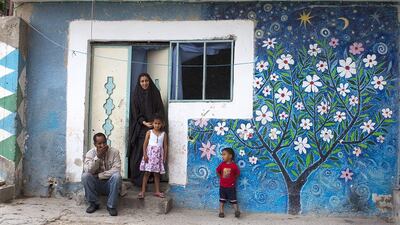BALATA REFUGEE CAMP, PALESTINE // On the wall of a shabby concrete apartment block in the West Bank’s Balata refugee camp, a bright mural of a flowering tree is a rare symbol of hope amid the ramshackle buildings and streets criss-crossed with frayed electrical wires.
Inside their tiny ground-floor apartment, Kamal Mousaid Tawfiq, 53, and his wife, Tahrir, 27, barely register when asked about it. Sat on a worn mattress in the five by four-metre room, they are more concerned with keeping a roof over the family’s head.
Optimism is a rare commodity in Balata but the announcement of a Palestinian unity government last week has offered a glimmer of promise to those living with the hardships of life under Israeli occupation.
The deal between Fatah, which governed the West Bank, and Hamas, which ruled Gaza, brought an end to seven years of internecine fighting between the factions. Palestinians have broadly welcomed the deal, which they hope may eventually lead to an improvement in their lives.
Mr Tawfiq believes that having the two factions now working together may lead to an improvement in the Palestinian economy and an easing of his financial suffering. He has had to borrow money all over Nablus to cover his monthly Dh360 rent and food for a family of five.
“I owe a lot of money but there is no work — and a lot of people are in the same situation. Look at this life we are living,” says Mr Tawfiq, waving towards the bare walls and concrete floor, where two of his children play oblivious.
Set up in 1952 to take in thousands of refugees who fled their homes after the establishment of Israel, Balata is a one kilometre patch of city on the outskirts of Nablus that is now home to around 30,000 people. During the second intifada the camp saw some of the most violent clashes between Israeli troops and Palestinian militants, and a decade later its pockmarked walls remain plastered with the posters of martyrs.
Down the street from Mr Tawfiq’s home, Osama Kharma, 32, stands in front of a wall of faded posters of his brother, Nasser, killed in 2004 during a gun battle with Israeli soldiers in central Nablus. Mr Kharma, now a security officer for the Palestinian Authority, has four children of his own but still takes care of his late brother’s four daughters.
He, like many in the camp, is cautiously optimistic about the Fatah-Hamas deal, even if the two parties have come to agreements before.
“Every year they say they will make unity,” he says, “and I would like to see it.”
But Mr Kharma has eight children to support and, as such, is far more concerned with their futures than he is with politics. A UN-sponsored school educates children up to the ninth-grade in Balata, but for many camp residents that is where their formal education ends.
The unemployment rate, already hovering around 30 per cent in the West Bank, is more than 40 per cent in Balata, and the groups of men sat smoking outside convenience stores or wandering the camp’s narrow streets on a hot Saturday afternoon are testament to what is a growing problem.
Numan Mashyakh, 57, sat outside a hair salon on the main road that cuts through Balata, is well placed to comment on politics. The former independent candidate in local elections says that many are still waiting to see whether the Hamas-Fatah deal translates into action.
“The hope is that the peace lasts, but I can’t see how it will since Fatah co-operates with Israel and Hamas does not,” he says.
Mr Mashyakh points out that there remains a great deal of support for Hamas among Palestinians. The party won a huge majority in the 2006 parliamentary elections before the outbreak of the conflict with Fatah, which saw the Islamist Hamas all but banned in the West Bank and Fatah driven from Gaza.
But, like Mr Kharma, it is the future of the next generation of young Balata residents that worries Mr Mashyakh more. Two of his sons are currently in prison in Israel and his third was recently released after serving five years. The latter has come out into a world where he has little hope of finding either work or further education.
“The only thing my sons care about now is getting out of prison and finding work, the situation in Balata only puts more pressure on them. All these people you see,” he says, waving his hand towards the busy street, “none of them have jobs.”
Those who do sometimes have to take huge risks to make a living. Suhaib, a 20-year-old construction worker standing outside his house in a tiny alley off Balata’s main drag, is one of thousands of Palestinians that sneak across the border into Israel to work illegally. Most are attracted by money, with Arab labourers in Israel able to earn up to Dh200 a day compared to Dh50 in the West Bank.
He admits the risks — the penalty for crossing into Israel without permission is often a stint in jail — but says that it is better than the situation faced by most of his friends, who don’t work at all. Many pass their time playing for the Balata football team.
“They don’t do anything but eat and drink and sleep,” says Suhaib.
A worry for the older generation is that the jobless young, devoid of prospects and opportunities in the West Bank, will turn to violence. Ahmed Mohammed Kahabni, 53, a former Fatah fighter, served 15 years in prison and while he is quick to say that he has no regrets about the time he spent incarcerated, he does not want his own children following his path.
“Education is the biggest problem in Balata — you see young guys everywhere, sitting around smoking, and they have nothing to do,” he says.
“I hope young people have a different life to us.”
foreign.desk@thenational.ae

